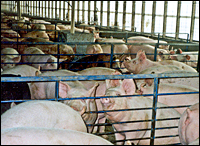
Photo: FarmSanctuary.org
Industrial animal farming in the United States needs to make many major reforms in order to protect public health and the environment, an independent two-and-a-half-year study by the Pew Charitable Trusts and Johns Hopkins Bloomberg School of Public Health has concluded. The report criticized the widespread use of antibiotics to promote animal growth, saying the practice can lead to antibiotic-resistant bacteria and may expose the public to antibiotics that would then be less effective when used to treat human diseases. The heavy concentration of pollution created by crowded factory farms, the quick spread of disease in tightly packed feedlots, and inhumane treatment of confined animals were also singled out for criticism and should be reformed as well, the study said. However, one of the most troubling issues the study authors encountered was industry influence on agricultural research and regulation. Robert Martin of the Pew Commission warned of the tremendous negative influence of “the agro-industrial complex — an alliance of agricultural commodity groups, scientists at academic institutions who are paid by the industry, and their friends on Capitol Hill.”

